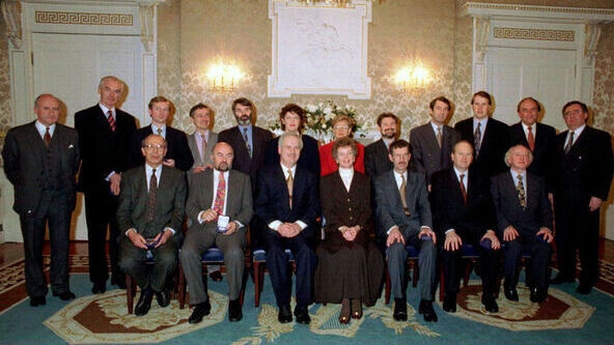By David McCullagh and Fiachra Ó Cionnaith
Every year we look at the tranche of previously secret government documents released to the National Archives and hope to find surprises.
This year, perhaps the biggest surprise about the release of material from 1994 is the almost complete absence of revelations about the biggest political story of the year, the collapse of the Fianna Fáil and Labour coalition.
Part of the reason for that absence, for that dog that didn't bark, is that the events of November 1994 were investigated by an Oireachtas Committee, which published a report in February 1995 dealing with what went on within government.
So, what records there are may already be in the public domain?
There may be a connected reason, files aren’t released until 30 years after they are closed (20 years in the case of material relating to Northern Ireland or Britain), and it is possible that there are files that were kept open until the Oireachtas inquiry finished, which may be released next year.
Or, and this is perhaps the most likely explanation, the rolling political crisis was happening so fast that developments weren’t being written down.
Like Ernest Hemingway’s description of how a character went bankrupt, the Fianna Fáil and Labour coalition collapsed "gradually and then suddenly".
Relations between taoiseach Albert Reynolds and tánaiste Dick Spring had been difficult from the start of their partnership in January 1993.

They got much worse when the report of the Beef Tribunal was delivered in the summer of 1994.
Without consulting his coalition partner, Reynolds rushed out a statement claiming he had been vindicated.
Trust had started to break down, and it collapsed entirely when Reynolds insisted on appointing attorney general Harry Whelehan as president of the High Court.
At the time, there was public controversy over how the Office of the Attorney General had handled an extradition request for paedophile priest Brendan Smyth to Northern Ireland.
The Labour Party boycotted the cabinet meeting at which the appointment was made.
News of a second extradition case then emerged and it appeared that it would be impossible to repair the damage to the government.
Read more:
Netanyahu lobbied for Dublin embassy, State Papers show
SF, govt had 'sharp exchange' over criminality comments
Weapon manufacture proposals rejected by separate govts
Iran offered 'secret meeting' to help free Brian Keenan
Gerry Adams pushed for US visa to allow fundraising
The only file released this year which relates to the controversy deals with Dáil motions of confidence in the government and contains a suggested draft section for a speech by the taoiseach, justifying his insistence on appointing Whelehan on the basis of precedent, of Whelehan’s 22 predecessors as attorney general, no less than 14 of them were appointed to high judicial office.
Such arguments cut little ice with Spring, and after a few more twists and turns, he ended up throwing in his lot with Fine Gael and Democratic Left to form the 'Rainbow Coalition’ government.
This elevated John Bruton to the role of taoiseach, where he was thrown into the deep end of a Peace Process that was already stuttering over the issue of IRA decommissioning and the wider question of criminal activity on the part of the various paramilitary groups.
Bruton, torn between the need to keep Sinn Féin on board and his own utter opposition to the use of violence for political ends, was known for his unconventional thinking, and was anxious to find out what northern nationalists really wanted, as he wasn’t convinced their views were accurately represented by Sinn Féin, the SDLP, or even his own government’s Department of Foreign Affairs.
This year’s papers also reveal an offer from diplomats to Fr Aidan Troy of emergency accommodation after he received death threats over the Holy Cross dispute.
The Peace Process wasn’t the only problem facing the diplomats of Iveagh House.
This year’s State Papers also reveal a heated dispute over renovations to the swimming pool at the residence of the Ambassador to the Vatican, and the distressing shortage of decent restaurants in Belfast. It’s tough in the diplomatic service.
[Based on documents in 2024/5/66]

